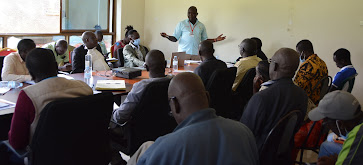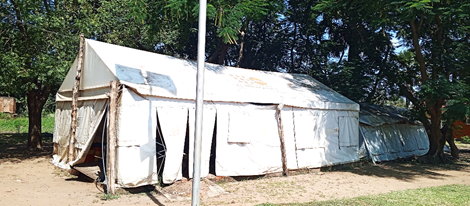DRDIP PIST Engage Districts as IPs Resume Implementation
 |
| IG Official addresses stakeholders during a meeting in Adjumani |
The IPs
who support activities under component II (Sustainable Environment and Natural
Resource Management) of DRDIP were put on hold since December last year due to identified shortfalls in the expected standards and delivery of
their services .
Under the
DRDIP implementation arrangement, the IG is charged with monitoring to ensure;
value for money, accountability, transparency, and maximum stakeholder
participation by the project implementers at all levels.
In a
communication dated December 23, 2021, the IG in demonstrating their role,
ordered the suspension of all IPs pending an establishment of satisfactory
implementation modalities and participation of all stakeholders.
As a
result, most activities undertaken by the IPs stalled and the unpredictable
weather conditions further worsened the situation as most trees in the various
woodlots withered, while others were destroyed by ants and wild animals due to
human negligence.
To
address the issues pertaining to the suspension, the PIST worked together with
the IGG and came up with proposed actions on how to address the gaps. The
actions include; national, district and community level engagement meetings.
The
district engagements were attended by key stakeholders including; Resident
District Commissioners (RDCs), District Council leadership, Chief
Administrative Officers (CAOs), District Police Commander(DPCs), District Internal
Security Officers (DISOs), District sector heads, DRDIP components focal points
and all the IPs in respective districts.
While
presenting a matrix of key thematic areas of attention to be followed, the
DRDIP M&E Specialist, Herbert Akampwera, said stakeholders should have the
designs and specifications of the various sub projects being undertaken so that
they can monitor implementations from an informed perspective.
“Let us
have all the funded projects displayed on the noticeboards and stakeholders including
IGG should also get a copy of the funded projects. All procurements should be
done in a transparent way so that stakeholders know what they are procuring.
Technical persons have to visit the sites and give certificates to ensure value
for money” Akampwera, said. “Use DRDIP
as a springboard to bring sustainable development to Hoima District” he added
while in the Bunyoro sub region.
DRDIP project implementation is guided by the Project Appraisal Document (PAD) and engagement of IPs are provided for in the PAD under pages 66-77 and 68 in the implementation of component two, Sustainable Environment and Natural Resources management (SENRM) and component three, -Livelihood Support Program (LSP).
To-date
the project has supported districts to identify and engage 21 IPs to support
community sub project activities in component two on environment and fragile
ecosystems restorations and efficient energy for clean cooking and efficient
lighting for households and institutions in all 15 beneficiary districts.
In Obongi
district, the CAO, Andrew Leru expressed optimism that the engagement will help
find the best, most consistent way of working collaboratively with the
partners. “Let’s forget about the challenges of the past and stick together to
make this Project a success for the people of Obongi”, he said.
In Hoima,
the CAO, Erias Byamungu, cautioned the IPs and other stakeholders implementing
DRDIP to desist from corruption and conspiracy tendencies, but focus on the
successful implementation of the project.
Byamungu said, “corruption tendencies must stop, if we are to see DRDIP
project going forward. This calls for progressive monitoring, not just once,
but all the way to the end and completion of the Project. practical completion,”.
DRDIP
livelihoods support unit head Peter James Malinga who gave a snapshot of the
project implementation progress for the meetings in; Obongi, Adjumani, Moyo,
Lamwo and Kiryandongo captured key components, allocations and the Community
Driven Development (CDD) approach. Malinga refreshed the stakeholders on the
project institutional arrangements, and highlights of funded projects using
both the initial ($ 50 million) and additional 50 million150million) from the
World Bank. He shared the implementation status for all sectors and outlined
the key project stakeholders and their roles.
The team
further shared agreed actions as guided by the IG which also implements the
STAAC (Strengthening Transparency, Accountability and Anticorruption) component
of DRDIP.
Some of
the key actions from these meetings included; strengthening coordination,
revamping communications aspects of the project through radio programs and
sharing of success stories to various stakeholders, integrating mindset
activities to change attitudes and to build ownership and sustainability.
Others included the call for more orientation of newly deployed leaders, as
well as joint monitoring with IPs, OPM, IG and the district.
DRDIP
seeks a paradigm shift in the way forced displacement is addressed in Uganda;
first as a developmental challenge due to covariant shocks from forced
displacements. Secondly, as a government-led development response, and thirdly
as a long term action to systematic and structural constraints that impede
development in refugee hosting areas. The project addresses the social
economic, and environmental impacts of protracted refugee presence in the host
communities and refugee settlements through interlinked-investment components.



Comments
Post a Comment